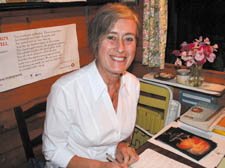|
|
 |
| |
 Ann Wroe at work in her garden shed in Hampstead, where she ‘scribbles at night’ Ann Wroe at work in her garden shed in Hampstead, where she ‘scribbles at night’ |
A passion for human chaos
Ann Wroe’s latest book was a ‘four-year battle’ with the poet Shelley and a tribute to her questioning imagination, says Piers Plowright
IF she can’t live by the sea, Hampstead Heath will do nicely for Ann Wroe.
She’s lived beside it since 1981 when she married her actor husband, Malcolm, and used it as a source of inspiration ever since.
Never more so than in her four-year battle with the genius of Percy Bysshe Shelley, the subject of her latest book (Being Shelley, reviewed June 28).
It’s an extraordinary work, reversing the usual biographical process of reaching the work through the life. This one leaps around in time and space to get at the essence of a man whose life was his poetry.
It’s a rescue operation, much-needed in Wroe’s view, on a writer hijacked over the past 20 years by political interpretations.
When we meet in a restaurant close to the offices of The Economist where she works as briefings and obituaries editor, she is passionate to put the record straight.
Not that Wroe is some starry-eyed romantic. Trained as a medieval historian, she has worked for the BBC World Service, specialising in French and Italian news stories, joining The Economist in 1976 to cover American politics.
Her first book, published in 1991, was on the Iran/Contra scandal and her second (1995), a study of life in a 14th-century French town.
There’s a rigorous mind here, alongside a questioning imagination, and both came brilliantly together one afternoon in Westminster Cathedral (Wroe is a very questioning Roman Catholic) when her eye fell on one of Eric Gill’s carved Stations of the Cross.
There were Christ and Pilate, face-to-face; the Roman governor so clearly perplexed and fascinated by the extraordinary figure brought before him.
Out of this confrontation came her third book, Pontius Pilate: the Biography of an Invented Man, “a book,” wrote one critic, “which will take root inside your head and grow there, like the seed from the Tree of Knowledge that grew through Adam’s skull”.
To write a book of such complexity or that of its successor, an engrossing piece of historical reconstruction of the life and times of Perkin Warbeck, the 15th-century pretender to the English Crown, as well as holding the day job at the Economist and, with her husband, bringing up three sons, has involved a lot of what Wroe calls “scribbling at night”.
This is something she’s done, she reveals, since her childhood, when she first discovered the power of story-telling in the Beatrix Potter books lovingly stored in a Great Aunt’s cupboard.
And something she’ll continue to do, I reckon.
Pure fiction isn’t her thing – her only attempt at a novel didn’t work – and, while the weekly obituary for The Economist is a satisfying challenge to the historian and critic in her, it’s that magical mix of human chaos and the questioning spirit that really fascinates.
No doubt, Ann Wroe will be out on Hampstead Heath this weekend with one of her densely scribbled-in notebooks, in search of the next epiphany.
n Piers Plowright is an award-winning BBC drama and documentary producer.
Documentary-making has earned him three Italia prizes and several Sony Golds. He lives in Well Walk, Hampstead.
|
 |
|
| |
|
 |
|
 Ann Wroe at work in her garden shed in Hampstead, where she ‘scribbles at night’
Ann Wroe at work in her garden shed in Hampstead, where she ‘scribbles at night’